- Home
- Jeff Lindsay
Red Tide Page 4
Red Tide Read online
Page 4
“There is, mate,” he said. “We’re in it. Can you get us out of here?”
My luck was working overtime. We had four more close scrapes—one with a huge Italian-built motor yacht that was 100 feet long, cruising down the center of the channel at a stately thirty knots, but I got us out of the channel alive and undamaged. When I cleared the last two markers and turned into the wind I told Nicky, “Okay. Raise the sails.”
He stared at me for a moment. “Sure. Of course. How?”
It turned out Nicky had never been on a sailboat before. So he held the tiller while I went forward to the mast and ran the sails up. Then I jumped back into the cockpit and killed the engine.
“Home, James,” said Nicky, popping two beers and handing me one. “It’s been a bitch of a morning.”
I took the beer and pointed our bow south.
It was a near-perfect day, with a steady, easy wind coming from the east. We sailed south at a gentle five knots, staring at the scenery. Cape Florida looked strange, embarrassed to be naked. All its trees had been stripped away by the hurricane. Farther south, the stacks of Turkey Point Nuclear Reactor stuck up into the air, visible for miles. It was a wonderful landmark for all the boaters. Just steer thataway, Ray Bob, over there towards all them glowing fishes.
• • •
The weather held. We made it down through the Keys in easy stages, staying the first two nights in small marinas along the way, rising at dawn for a lazy breakfast in the cockpit, then casting off and getting the sails up as quickly as possible. Part of the pure joy of the trip was in the sound of the wind and the lack of any kind of machine noise. We’d agreed to do without the engine whenever we could.
That turned out to be most of the time. Nicky took to sailing quickly and without effort. We fell into the rhythm of the wind and the waves so easily, so naturally, that it was like we had been doing this forever, and would keep doing it until one day we were too old and dry and simply blew gently over the rail, wafted away on a wave.
The third night we could have made it in to Key West. But we would have been docking in the dark, and working a little harder than we wanted to. So we pulled in to a small marina with plenty of time left before sunset.
Nicky used the time doing what he called rustling up grub. I don’t know if that’s how they say it in Australia, or if he heard it in some old John Wayne movie. From what he’d told me about Australia, there’s not much difference.
I sat in the cockpit with a beer, stretched out under the blue Bimini top, and waited for Nicky to get back. I had a lot to think about, so I tried not to. But my thoughts were pretty well centered on Nancy.
It was over. It wasn’t over. I should do something. I should let it take its course. It wasn’t too late. It had been too late for months. Eeny meeny miny mo.
Luckily, Nicky came back before I went completely insane. He was clutching a bag of groceries and two more six packs of beer.
“Ahoy the poop,” he shouted. “How ’bout a hand, mate?”
I got him safely aboard and he went below to the little kitchen. It sounded like he was trying to put a hole in the hull with an old stop sign while singing comic opera, so I stayed in the cockpit, watching the sun sink and thinking my thoughts.
There is something very special about sunset in a marina. All the people in their boats have done something today. They have risked something and achieved something, and it gives them all a pleasant smugness that makes them very good company at happy hour. A few hours later the people off the big sports fishermen will be loud obnoxious drunks and the couples in their small cruising sailboats will be snarling at them self-righteously from their Birkenstocks, but at sunset they are all brothers and sisters and there are very few places in the world better for watching the sun go down than from the deck of a boat tied safely in a marina after a day on the water.
I sipped a beer. I felt good, too, although my mind kept circling back to Nancy, and every time it did my mood lurched downwards. But it’s hard to feel bad on a sailboat. That’s one reason people still sail.
Anyway, tomorrow we would be home. I could worry about it then.
Early the next morning we were working our way towards Key West, about two miles off shore on the ocean side. We had decided on the ocean side because of the mild weather. With the prevailing wind from the east, we would have a better sail on the outside, instead of in the calmer waters of the Gulf on the inside of the Keys.
And because the weather was so mild, we went out a little further than usual. Nicky was curious about the Gulf Stream, which runs close to the Keys. I put us onto its edge, and by early afternoon we were only a few miles out of Key West.
Nicky had dragged up his black plastic box and, surprise, pulled out a large handgun.
Like a lot of other foreigners who settle in the USA, Nicky had become a gun nut. He was not dangerous, or no more dangerous than he was at the dinner table. In fact he had become an expert shot and a fast draw. The fast draw part had seemed important to him out of all proportion to how much it really mattered. I put it down to the horrors of growing up a runt in Australia.
Somehow Nicky managed to rationalize his new love for guns with his philosophy of All-Things-Are-One brotherhood. “Simple, mate,” he’d said with a wink, “I’m working out a past life karmic burden.”
“Horseshit.”
“All right then, I just like the bloody things. How’s that?”
Nicky had a new gun. He wanted to fire off a few clips and get the feel of it. Since we were out in the Stream and the nearest boat was almost invisible on the horizon, I didn’t see any reason why not. So Nicky shoved in a clip and got ready to fire his lovely new toy.
It was a nine millimeter Sig Sauer, an elegant and expensive weapon that Nicky needed about as much as he needed a Sharp’s buffalo rifle, but he had it and so far he hadn’t blown off his foot with it. I was hoping he would stay lucky.
“Ahoy, mate,” called Nicky, pointing the gun off to the south, “thar she blows.”
I turned to follow his point. A bleach bottle was sailing slowly out into the Gulf Stream.
“Come on,” Nicky urged, “pedal to the metal, mate.”
I tightened the main sheet and turned the boat slightly to give him a clear shot and Nicky opened up. He fired rapidly and well. The bleach bottle leaped into the air and he plugged it twice more before it came down again. He sent it flying across the water until the clip was empty and the bottle, full of holes, started to settle under.
I chased down the bottle and hooked it out with a boathook before it sank from sight. There’s enough crap in the ocean. Nicky was already shoving in a fresh clip.
“Onward, my man,” he told me, slamming home the clip and letting out a high, raucous, “Eeee-HAH!” as he opened a new beer.
We were moving out further than we should have, maybe, out into the Gulf Stream. It’s easy to know when you’re there. You see a very abrupt color change, which is just what it sounds like: the water suddenly changes from a gunmetal green to a luminous blue. The edge where the change happens is as hard and startling as a knife-edge.
“Ahoy, matey,” Nicky called again, pointing out beyond the color change, and I headed out into the Gulf Stream for the new target.
“Coconut!” Nicky called with excitement as we got closer. It was his favorite target. He loved the way they exploded when he hit them dead on.
I made the turn, adjusting the sheet line and again presenting our broadside, and swiveled my head to watch.
Nicky was already squinting. His hand wavered over the black nylon holster clipped to his belt. He let his muscles go slack and ready. I stared at the coconut. From fifty yards it suddenly looked wrong. The color was almost right, a greyish brown, and the dull texture seemed to fit, but—
“Hang on, Nicky,” I said, “Just a second—”
But the first two shots were already smacking away, splitting the sudden quiet.
I shoved the tiller hard over and brought us into
the wind. The boat lurched and made Nicky miss his second shot. He looked at me with an expression of annoyance. I nodded at his target. He had hit the coconut dead center with the first shot. It should have leapt out of the water in a spectacular explosion. It hadn’t. The impact of the shot pushed it slowly, sluggishly through the water and we could both see it clearly now.
It wasn’t a coconut. Not at all.
It was a human head.
Chapter Five
A lot of people have gotten into the habit of bad-mouthing the Coast Guard, but let me say this in their favor: they really know how to handle a dead body that’s been in the water a week, nibbled by sea-life, and then shot in the head.
It was only about half an hour from the time I raised them on my radio to the time the Coasties were sliding the black body bag up into a French-built helicopter, and whisking it away. They did it with casual efficiency, flicking off the clinging sea life without losing any body parts.
Lieutenant Ray Harkness, a short guy with the square silhouette of a body-builder, was in command of the chopper. He had grown up in Key West and I knew him slightly. When the body was loaded he leaned out. “Billy,” he said.
“Yeah.”
“The way this works, I’m supposed to take you in. But I know you, and you’re not going anywhere, right?” He looked at me a little harder than he needed to, but I guess a dead body is a good excuse.
“That’s right, Ray,” I said.
He nodded. “So you just get yourself in to the Sheriff’s office. They’re waiting on you.” His eyes flicked to Nicky. “Two of you don’t show up in the next couple of hours I’m in trouble. But not as much as you.”
“We’ll be there, Ray.”
He looked at me again, then nodded. He pulled his head back into the chopper and a moment later it was whistling away towards Key West.
Under the circumstances we took the sails down and motored in. Nicky didn’t have a lot to say on the ride in. He seemed shaken. He sat with his head down and for the first time since I’d known him he looked like a very small guy with no chin. When we were only about twenty minutes away from the dock he shot up suddenly, lurched his body over the side of the cockpit and threw up.
I didn’t say anything. Death hits some people harder than others, and this was an ugly death, a death complete with rot and bloating. Nicky was not used to death in any form, had not seen the things I had seen, and he probably felt guilty, too, in some weird, illogical way. He had shot this man in the head and immediately afterwards seen the decomposed body. So it became his fault.
We got the boat tied up in a slip next to Betty’s. Betty herself was out until sundown, according to a note tacked to the piling. So I tied off the Sligo fore, aft, and spring lines.
Nicky hunched over on the dock while I scrubbed down the boat. His color was a little better, but he still looked like a half-dead water rat. He tried to help at first, but he kept staring off into space and running his shoes full of water so I sat him down until the boat was clean, secure and buttoned up.
By the time we got to the sheriff’s station Nicky was almost normal. He surrendered his pistol meekly. We were told to keep ourselves available for questioning and we promised we would. The cops were polite; other towns can get away with judging somebody’s importance and political clout by what they wear. Key West cannot. In a town where cut-offs, T-shirts, and thongs are formal wear, anybody might be somebody.
So they stayed polite up until we were about to leave. That is, until I thought we were about to leave. Nicky had other ideas.
“Do they know anything yet?” he asked the Sergeant quietly.
“I wouldn’t worry about it, Mr.—” the Sergeant glanced down at the forms on his desk. “Mr. Cameron.”
“But do they have any idea, you know. About the, uh—the body?”
Cops aren’t hard-asses twenty-four hours a day. Sometimes that’s a mistake. The Sergeant, seeing a meek, tiny local merchant, had a softhearted moment. “Mr. Cameron, the Coast Guard thinks this was a Haitian national. These people put to sea in things I wouldn’t let my kids use in a wading pool. It’s a sure bet his boat swamped and he drowned. Happens all the time.”
“So you’ll let us know, eh Sergeant?” Nicky asked as I was half-turned to go.
“Let you know what, sir?” the Sergeant asked, already amused.
“What happens. How it comes out. What you discover.” Nicky poured his words into the increasing silence. There is nothing as quiet as a police sergeant’s poker face.
“Discover about what, Mr. Cameron?”
Nicky leaned in, as though increasing his volume and intensity might drag the Sergeant out of his apathy. “You remember? There was a dead body? We found it. Man was dead.” He said it in that flat Australian way nobody else seems able to copy.
The sergeant, a guy I knew very slightly, looked at me and raised an eyebrow.
“Australian idealist,” I said. “Believes in truth and justice. Thinks you have a big red ‘S’ on the front of your shirt.”
He turned back to Nicky with a tolerant, very small, smile. “There won’t be much of an investigation, sir. There’s a problem with jurisdiction. And this is really not that big a deal.”
“It bloody well is to the dead guy.”
The cop took a deep breath. I could almost see him counting to ten. It would have been funny under other circumstance. “Let me give you a word of advice, Mr. Cameron.”
“I’d be de-bloody-lighted to hear it.”
“Forget about this.”
Nicky’s mouth hung open. He blinked. He looked at me, then back at the sergeant. “Do what?”
“Forget about it. Put it out of your mind. Pretend it never happened.”
Nicky took a step back. Then he started to get taller. I don’t know how he does it. The sergeant’s eyes got wide as he watched.
“Aw, yeah, mate, that’s bloody lovely. How’s about we ask the dead guy to pretend it never happened while we’re at it, eh? I reckon that’ll take care of the whole bloody damn shootin’ match, eh? You lot’d like that. Go home and have a few cold ones and fergit it all, eh?”
“Nicky,” I said, trying to slow him down. It didn’t work.
“That’d be fan-fuckin’-tastic, wouldn’t it, mate? Just fer-fuckin’-get the whole fuckin’ thing. He’s not dead! Because it never happened! That’ll bring a nice stiff smile to his face, eh?”
The sergeant’s face was starting to gain just a little bit of expression. It wasn’t a smile.
“Nicky,” I said, trying now to edge him out the door.
“Mr. Cameron,” the sergeant said, leaning forward as if to make sure he really was taller than Nicky. “This is a police matter and the police will handle it.”
“Like they handle everything else?” Nicky demanded.
“That’s right.”
“Perfect. Bloody wonderful! Case is good as solved!”
“Come on, Nicky,” I said, taking him by the elbow and dragging him towards the door.
“The only thing worse than a police state—is an incompetent police state!” he shouted, and I got him outside.
Outside the station Nicky deflated again. We got home without saying more than three words. Unfortunately, it was the same three words, over and over. Nicky would smack his fist into his hands as though just discovering something and mutter, “Forget it! Christ!” and then grind his teeth together silently until he needed to say it again.
He wanted to do something about this. The small part of me that still thinks like a cop wanted to kid him about it. But the rest of me was a citizen now. I let him work it out for himself. Besides, I was afraid he might tear into me like he had the sergeant.
He left me at his door, still quietly smoldering.
Just before he closed the door, though, he turned back and looked me in the eye. “This hasn’t ended, Billy,” he said in a strange, I-Have-Been-There-And-Seen-It tone of voice. “This goes on.”
I didn’t have a clue what
he meant. “Okay, Nicky.”
“I mean it, mate. There will be more to this. Fair dinkum. See if there ain’t.”
“I think you better have a nice hot cup of tea, Nicky.”
He rubbed his eyes, dwindling with each breath. “Yeah. And then a nice lie-down.”
“I’ll see you later.”
“Ta, Billy.”
He closed his door and I headed home.
It wasn’t hard to realize in a general way what he was going through. He had found a corpse. He’d been expecting fireworks, commotion, wheels set in motion, shouting and wailing and gnashing of teeth. The cops hadn’t obliged, and he was realizing that they wanted this to trail off into a few forms to fill out and maybe two lines in the paper. And then, no matter how much indignation Nicky summoned, it would be over. Life would go on. The cops wouldn’t even think about it anymore.
That can be tough to accept. In a funny, finders-keepers way this was Nicky’s body, and he wanted what was best for it. And when most people encounter death they feel like it should mean something. Death is impressive, and if you don’t see it every day—the way I had when I was a cop—then it seems more significant than it really is and you want it to add up to something important, noble and meaningful.
It doesn’t. Death makes us all a little smaller and a little cheaper. There is so much of it, more of it than of anything else, and it is all that is guaranteed to us in life. You can have your nose rubbed in that a few times and get used to the idea, go on with waiting for it.
But if you’re a small Australian New Age astrologer and aromatic oil salesman, the idea takes some getting used to.
Chapter Six
Life goes on. That’s not always good news, but it’s always true. Life. Goes. On. Terrible things happen and we wonder why the sun doesn’t stop dead in the sky, but it never does. At the same time that we’re staring at the broken pieces of our life, somebody else is wondering whether to have another slice of bacon or go right for the cheesecake.

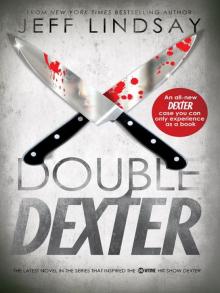 Double Dexter
Double Dexter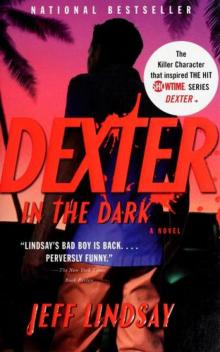 Darkly Dreaming Dexter
Darkly Dreaming Dexter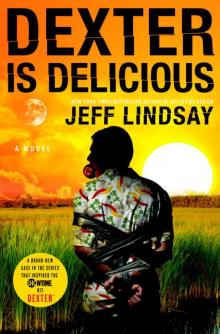 Dexter Is Delicious
Dexter Is Delicious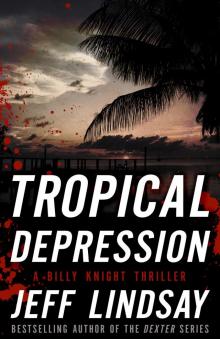 Tropical Depression
Tropical Depression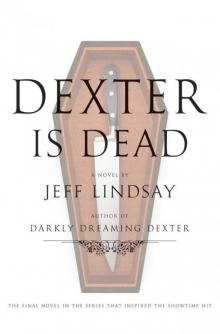 Dexter Is Dead
Dexter Is Dead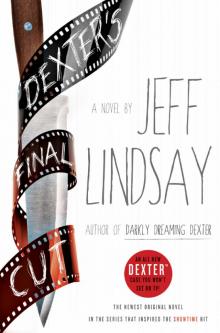 Dexter's Final Cut
Dexter's Final Cut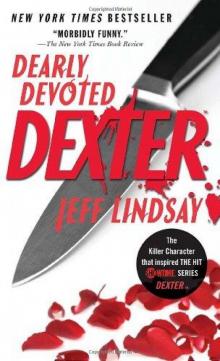 Dearly Devoted Dexter
Dearly Devoted Dexter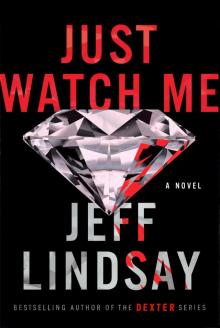 Just Watch Me
Just Watch Me Red Tide
Red Tide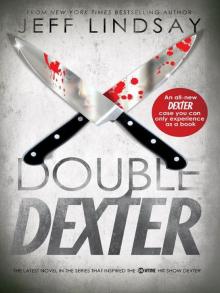 Double Dexter: A Novel
Double Dexter: A Novel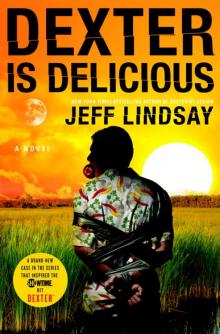 Dexter is Delicious: A Novel
Dexter is Delicious: A Novel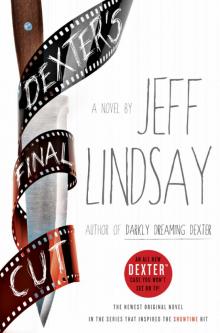 Dexter's Final Cut d-7
Dexter's Final Cut d-7